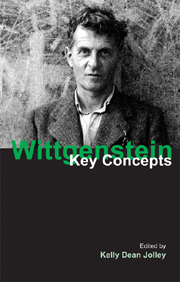Book contents
- Frontmatter
- Contents
- Contributors
- Abbreviations
- Introduction
- 1 Wittgenstein's philosophical remarks
- 2 Wittgenstein on meaning and meaning-blindness
- 3 Language-games and private language
- 4 Wittgenstein on family resemblance
- 5 Ordinary/everyday language
- 6 Wittgenstein on rule-following
- 7 Thinking and understanding
- 8 Psychologism and Philosophical Investigations
- 9 Moore's paradox revisited
- 10 Aspect perception
- 11 Knowing that the standard metre is one metre long
- 12 Therapy
- 13 Criteria
- 14 Grammatical investigations
- 15 Teaching and learning
- 16 Expression and avowal
- Chronology of Wittgenstein's life
- Bibliography
- Index
7 - Thinking and understanding
- Frontmatter
- Contents
- Contributors
- Abbreviations
- Introduction
- 1 Wittgenstein's philosophical remarks
- 2 Wittgenstein on meaning and meaning-blindness
- 3 Language-games and private language
- 4 Wittgenstein on family resemblance
- 5 Ordinary/everyday language
- 6 Wittgenstein on rule-following
- 7 Thinking and understanding
- 8 Psychologism and Philosophical Investigations
- 9 Moore's paradox revisited
- 10 Aspect perception
- 11 Knowing that the standard metre is one metre long
- 12 Therapy
- 13 Criteria
- 14 Grammatical investigations
- 15 Teaching and learning
- 16 Expression and avowal
- Chronology of Wittgenstein's life
- Bibliography
- Index
Summary
Introduction
Consider some questions: What is thinking? What is understanding? What affords us the right to say of someone that they are thinking? What are the criteria of correctness for employment of the word “understanding” (i.e. what grounds do we have for predicating of someone understanding)? Is there something common to all instances of “thinking” and of “understanding” that helps us here? Indeed, could there be some thing or process underlying instances of thinking and understanding (respectively) that could satisfy us?
Two more questions. What view(s) did Wittgenstein hold on “thinking” and on “understanding”? Did Wittgenstein offer us an answer to the questions “What is thinking?” and “What is understanding?”?
One of the areas of philosophy to which Wittgenstein is taken to have contributed most is philosophical psychology, and he certainly had things to say about thinking (and thought) and understanding (see e.g. PI §§138–55 for a discussion of “thinking” and §§327–76 for a discussion of “understanding”). But does that mean he held or propounded, qua philosopher, (philosophical) views on these issues? Wittgenstein is taken by many to have held that much of mental life, what we call thinking, is linguistic in some deep way, and thus being committed to the notion that that which cannot speak cannot think. Consider the following passage from Matt Cartmill (a sadly indicative example, selected for its availability – i.e. its Google-ability – online):
Many Western thinkers have … insisted that because animals can't talk, their mental lives are defective in big ways, or even nonexistent. “Thinking”, wrote Wittgenstein, “is essentially the activity of operating with signs”. […]
- Type
- Chapter
- Information
- WittgensteinKey Concepts, pp. 92 - 108Publisher: Acumen PublishingPrint publication year: 2010
- 1
- Cited by

